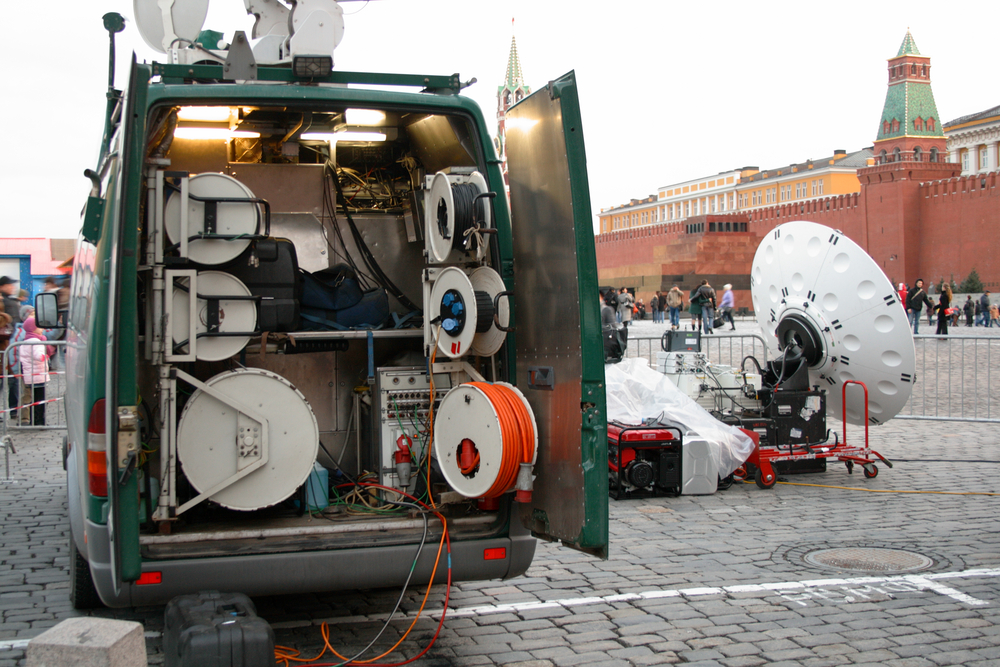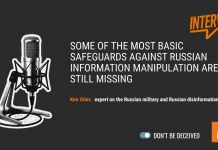
The Ukraine crisis, which began with the EuroMaidan protests at the end of November 2013 escalating to a full-blown revolution by mid-February 2014 with the ousting of Viktor Yanukovych and later leading to the Russian annexation of Crimea and the war in Donbas, has exposed a key component of Russian foreign policy – its propaganda. Even before the escape of Yanukovych from Kyiv, Russian propaganda was elevated and the information war became one of the main fronts of the conflict. Soon, questions as to who was at fault for the Ukrainian situation, new narratives on history and a fear that ultra-right nationalists were taking over in Kyiv spread to Berlin, Paris, London and New York. It was a clear sign that not only was Russian propaganda effective, it also found a receptive audience in many Western countries around the world.
The aim of Russian propaganda is simple (when I refer to Russian propaganda in this case, I am not discussing the Russian media internally, rather my focus in this essay is on Russian information policy outside the country). In fact, it is often that we do not really understand this aim. In this crisis, the Russian propaganda machine is not designed to convince the West that Russia is right and Ukraine is terrible (though it helps when people change opinions in favor of Russia). The aim, rather, of the propaganda actions is to add confusion and noise to the mainstream narrative, which is usually based on facts. What’s more, Russia does not need to create a network of supporters in the West, it just adds encouragement to extremist groups that have a track record of being anti-mainstream, anti-West, but especially anti-American. This includes groups like traditional allies of Russia in Europe such as the far left, but also new allies like the far right – such as France’s National Front, Hungary’s Jobbik, or even UKIP in the United Kingdom. These groups, known for their brash populism and anti-European attitudes, have become a vehicle for Russian messages.
Therefore, by creating enough doubt and fueling extremist ideas and conspiracies, the Russian message is now being spread not only by the more traditional “useful idiots” (a term often accredited to Lenin himself), but also by politicians with real popular support and political influence.
Question more…
A perfect example of how Russia is creating noise and confusion is the multi-national, multi-lingual television station called “RT” (previously known as Russia Today). RT’s slogan is “question more”. And that is exactly what they want you to do – question Western ideas, beliefs and values. For years, RT has become a platform for an alternative perspective on the world. The main purpose of the journalists, commentators, and “experts” on RT is to cover mainstream issues through a massively critical lens and a production that looks exactly like CNN or BBC. The fancy studios, English-speaking presenters and snappy headlines gives the viewer the impression that this is a serious news agency, just like any other Western media organisation.
Before the Ukraine crisis, RT was even recognised for its alternative approach. In 2010, RT was nominated for an Emmy in the category of news and current affairs for its coverage of Occupy Wall Street, which conveniently showed that the Western liberal, capitalistic model was failing the people. And even in 2014, RT Spanish was named the best TV resource by the Mexican Press Club – a prestigious recognition.
Yet, by employing Western and English speaking staff, RT has created a dilemma for its journalists and reporters. It is no secret that RT is owned and operated by Russia and promotes Kremlin interests. It seems, though, that there are limits. After the annexation of Crimea and the aggression in Ukraine’s east, two reporters, Liz Wahl (American) and Sara Firth (British), quit RT in protest of the escalated propaganda and lack of concern for the truth by the network.
Truth as an obstacle
However, unlike Western media organisations, RT is not concerned with the truth. And this is one of the key reasons why Russian propaganda is so successful in the West. In our post-modern society, we believe that there are many perspectives and many sides to a story. In media and journalism, that means that we search for the truth amongst all the perspectives. As journalists we analyze and provide the various perspectives in order to reach the truth. The problem with this approach is that you cannot find truth where there is none.
This creates a huge dilemma for the West. We are wired not to ignore a point of view. In the information war against Ukraine (and the West), this means that there is a natural reaction to listen to Russia’s point of view and consider her case. In our 21st century media environment, which is very competitive, sensation also helps. Hence, it has become a perfect-storm for Western media organisations for two reasons: 1) they can publish a point of view (despite the level of truth to it) because we believe in giving a platform to all points of view; and 2) because it is controversial it could increase readership and, hence, increase ad revenue. The fact that it may seriously harm Western support for Ukraine in such a situation is not a point for consideration among editors and producers.
Examples in the Western media are easy to find. John Mearsheimer’s article in Foreign Affairs titled “Why the Ukraine Crisis Is the West’s Fault” is one of the more popular examples of this. Australian journalist John Pilger was even more blunt (and extremely wrong) when he wrote in the Guardian that: “Having masterminded the coup in February against the democratically elected government in Kiev, Washington’s planned seizure of Russia’s historic, legitimate warm-water naval base in Crimea failed. The Russians defended themselves, as they have done against every threat and invasion from the West for almost a century.”
It is not so much of a surprise that Pilger, who is rabidly anti-American, wrote such a piece. But it is more surprising that the Guardian, a mainstream news organisation which has a daily circulation of 185,000 copies and online traffic of over eight million users a month, published such blatant lies, where Pilger has no problem labelling the new authorities in Kyiv as “neo-Nazis unleashed by the US and the EU”. Apparently, by publishing Pilger’s text in a section called “Comment is free”, the editors bore no responsibility for its message.
This emphasizes the fact that for Russia there is no dilemma. The truth is not an obstacle. If something is not true, Russian propagandists make it true. At the very least, they make the truth questionable and that is enough to discount any factual argument used against Russia.
Considering lies as a perspective to help us understand the truth leads us to another key aim of Russian propaganda: to create a new reality. In order to undermine its enemy in the information war, Russia therefore not only needs to confuse through spreading of lies, but it also needs to create an alternate reality for others to believe in. The falsely applied geographic description to parts of Eastern Ukraine, which is now being referred to as Novorossiya, is a perfect example. Novorossiya was a little-known term that was lost to the history books and used to refer to territories that the Russian Empire gained after wars with the Ottoman Empire in the 18th century. Conveniently, the term is now applied to regions of Ukraine that Russia claims has never been really a part of Ukraine (much like Crimea) and indeed has its own identity vis-à-vis Novorossiya.
How to fight propaganda?
The European Union’s weakness to respond adequately and appropriately to Russian propaganda is yet another easy exploitation for Russia. Whereas Russia has propaganda, the EU has an “information policy”. In the current information war, the EU’s approach stresses “information”; while the Russian approach stresses “war”. Obviously, EU policy is no match for the slick, massively funded Russian propaganda machine which is not restricted by truth. Hence, the information war that has emerged since the Ukraine crisis begs the question: how does one fight propaganda?
The most tempting answer here is to stoop to your opponent’s level by fighting lies with more lies. This would indeed be an offensive approach in the information war. Yet, it is well beyond our values to conduct such an offensive. If we relegate ourselves to such a level, we would indeed be compromising our own values.
Instead, a more defensive approach is probably the best method to counteract Russian propaganda. In the West, we should no longer consider Russian lies a “perspective”. We need to become bolder and call out a lie when one is clearly used. We also need to stop repeating such narratives like “the West provoked Putin” and “Russia is just defending its sphere of influence”; because such phrases immediately discount Ukraine as an independent state capable of choosing its own future.
Certainly, Russian lies are an effective weapon in the information war. But perhaps there is another effective weapon, one which we have not yet learned how to use properly, and that is the truth. Let’s hope that there’s a chance to fight back with this weapon, before it is too late for Europe.
By Adam Reichardt, New Eastern Europe
Adam Reichardt is editor in chief of New Eastern Europe.




